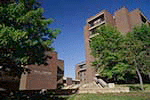The Mathematics Graduate Program at Rutgers University offers courses of study leading to the degrees of Ph.D. and M.S. A quick link to an overview of our Ph.D. program is here. The M.S. degree has two options, the mathematical finance option, and the traditional option.
The Graduate Faculty in mathematics has about 65 active members from the Department of Mathematics, and is augmented by approximately 20 other faculty members in other departments of Rutgers University. Our faculty covers a wide range of areas of expertise.
In fall 2016 there were 76 full-time Ph.D. students in our program. We are committed to fostering success in our students. As part of that commitment, we have been able to consistently provide financial support to nearly all of our doctoral students through teaching assistantships, fellowships, and research funds. The Graduate Program has been successful in the past obtaining support for groups of students through various federal grants. In 2009, we obtained funding for graduate fellowships through the GAANN (Graduate Assistance in Areas of National Need) program, which has been used primarily to provide fellowship support for entering students over the next three years; 11 students entered our Ph.D. program with GAANN fellowship support between 2010 and 2012. In fall 2012 we obtained another GAANN grant, which provided at least nine fellowships from 2012 to 2016.
Supplementing about 45 graduate courses given each year are numerous weekly seminars and the Friday afternoon colloquium. In addition, each academic year, there are a number of special lecture series and conferences. Seminars in other programs such as Quantitative Biology (formerly BIOMAPS), Computer Science, DIMACS, Physics, Statistics, and Operations Research are easily accessible and may be of interest. Regional, national, and international meetings on mathematics and closely related subjects are frequently held at Rutgers.
The Mathematics Graduate Program at Rutgers is enhanced by its proximity to major academic institutions in New York and Princeton and to several industrial research laboratories in New Jersey.
For more information, contact us.


